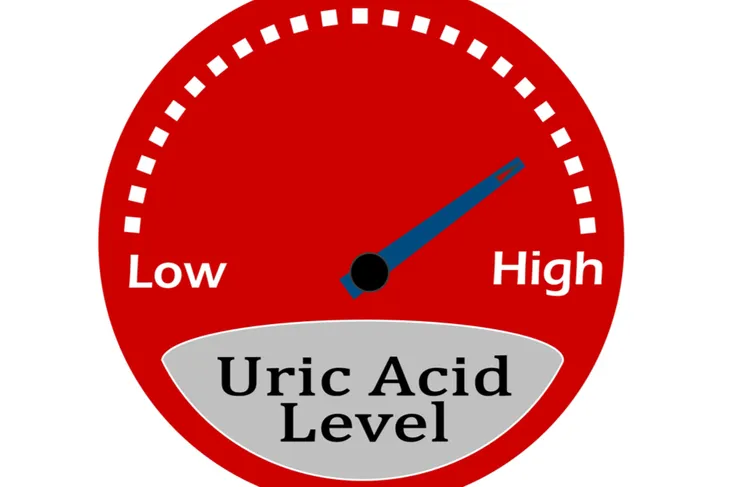- Uric acid is a natural waste product that’s typically expelled from the body in urine.
- However, about 1 in 5 people have high uric acid levels.
- Those with high uric acid levels can develop crystals, leading to gout and kidney stones.
- Dietary and lifestyle changes can help manage uric acid levels.
Uric acid is something many people don’t spend much time thinking about. That makes sense — when the body functions properly, it’s flushed out and doesn’t cause health concerns. Unfortunately, some people deal with high uric acid levels.
High uric acid levels can lead to health issues. Fortunately, understanding the root causes of high uric acid levels can help make it easier to manage levels. Keep reading to learn more about uric acid, why you should care about it, and how to lower uric acid levels.
What Is Uric Acid?
Uric acid is a natural waste product. The Cleveland Clinic says, “It’s created when the body breaks down chemicals called purines.” Purines are naturally occurring chemical compounds in certain foods, including red meat and seafood.
Typically, uric acid travels to the kidneys and is expelled in urine. But some people don’t eliminate enough uric acid. If excess uric acid builds up, then the source says gout and kidney stones can develop. According to the Mayo Clinic, roughly 1 in 5 people have high uric acid levels.
Causes of High Uric Acid Levels
While it isn’t clear what causes high uric acid levels in every case, Medical News Today says several factors can play a part. For instance, genetics, health, and diet can contribute to high uric acid levels.
According to the source and the Mayo Clinic, specific risk factors include:
- Eating a high-purine diet
- Being overweight
- Having high blood pressure
- Using diuretics
- Drinking too much alcohol
- Having diabetes
- Having hypothyroidism
Additionally, the Mayo Clinic says those undergoing chemotherapy or radiation treatment have an increased risk of high uric acid levels.
What Is Hyperuricemia?
Hyperuricemia is the medical term for high uric acid levels. According to Medical News Today, “It can occur if the body produces too much uric acid or does not get rid of enough of it.”
The Cleveland Clinic says urate crystals can form when too much uric acid stays in the body. This is an issue because those crystals can settle in the joints or kidneys. We’ll dig into the details of commonly associated medical conditions next.
Gout and Kidney Problems
Certain medical conditions are related to hyperuricemia. Gout and kidney problems, in particular, can go hand in hand with high uric acid levels. According to Medical News Today, gout is a form of arthritis where “uric acid builds up in the joints and tissue.” It can cause pain and swelling in toe joints, ankles, and knees.
As we mentioned earlier, kidneys help expel uric acid from the body. Kidney disease damages the kidneys, so it makes sense that the condition can mess with the normal process. “When this happens,” the source says, “waste products that include uric acid can build up in the blood.” Additionally, urate crystals can lead to kidney stones.
Untreated High Uric Acid Levels
Hyperuricemia isn’t a disease, but in some cases, there are potential risks if it’s left untreated. In addition to gout and kidney problems, the Cleveland Clinic says “high uric acid levels may eventually lead to permanent bone, joint and tissue damage.”
The Mayo Clinic notes, however, that high uric acid levels don’t necessarily need to be treated. If you have a gout attack or develop a kidney stone, then your doctor may decide to check for hyperuricemia. Your doctor can then assess whether treatment is necessary.
Diagnosing High Uric Acid Levels
In order to diagnose hyperuricemia, Healthline says your doctor may order blood and urine tests. If blood tests show elevated uric acid levels, then urine tests are often the next step. Should your doctor order a 24-hour urine collection, the source says a second urine test will likely follow.
Before this second test, your doctor will probably instruct you to follow a low-purine diet. That way, they can determine whether the issue stems from eating too many high-purine foods or something else. For example, the source says your body may be making too much uric acid or failing to excrete enough.
Treating High Uric Acid Levels
If your doctor decides treatment is necessary, then the next step depends on what’s causing the hyperuricemia. When gout is the underlying condition, Healthline says doctors commonly prescribe medications to treat it. Should kidney stones be the underlying condition, the source says there are a few treatment possibilities.
When the stone is smaller than 5-millimeters, you may be instructed to drink more water and take over-the-counter pain medications until it passes. If the stone is slightly larger, then your doctor may prescribe medication to relax the urinary tract muscles. And unfortunately, stones larger than 10-millimeters may require surgery.
High-Purine Foods To Avoid
Adjusting your diet is another way to help manage high uric acid levels. With this goal in mind, WebMD suggests avoiding these high-purine foods:
- Red meat, pork, and lamb
- Seafood, especially shellfish
- Organ meats like liver
- High-fructose foods and drinks
- Beer and grain liquors
Of course, you should talk with your doctor before overhauling your diet. They can help determine if dietary changes make sense for your situation. Additionally, the source cautions that the effects of adjusting your diet are relatively minor compared to the effects of taking medication.
Low-Purine Foods To Eat
If your doctor determines that dietary changes do make sense for you, then WebMD says you may want to eat more of the following low-purine foods:
- Fresh fruits and vegetables
- Low-fat yogurt and milk
- Nuts and grains
- Potatoes, rice, and pasta
The source also says eggs and chicken are fine in moderation. Beyond limiting your intake of certain foods and increasing your intake of others, there are more dietary-related steps you can take. We’ll get into the details next.
Drink More Water, Consume More Fiber
Drinking more water is another thing you can do to help manage uric acid levels. Staying hydrated is essential because drinking water can help kidneys flush uric acid out of the body. Healthline recommends keeping a water bottle with you. That way, you’re more likely to take sips throughout the day.
Similarly, the source says adding more fiber to your diet can make a difference. Fiber not only helps flush uric acid out of the body but also helps increase satiety. As a result, you may be less likely to overeat. The source suggests adding 5- to 10-grams of fiber to your daily diet.
Lifestyle Changes
Stress, poor sleep quality, and too little exercise can cause inflammation, which Healthline says “may set off a high uric acid level.” So, it can help to help to reduce stress by taking care of yourself. The source suggests trying yoga and breathing exercises.
If you’re having trouble getting a good night’s sleep, then you may want to tweak your sleep habits. For example, the source recommends avoiding digital screens before bedtime, following a consistent sleep schedule, and staying away from coffee after lunch.
The Takeaway
Uric acid is a natural waste product that can contribute to gout attacks and kidney stones if the body doesn’t efficiently eliminate it. While high uric acid levels don’t always require treatment, untreated hyperuricemia can cause permanent joint, bone, and tissue damage over an extended period of time.
If you think you may have high uric acid levels, then talk with your doctor. They can assess the situation, order any necessary tests, and decide whether treatment is appropriate.















